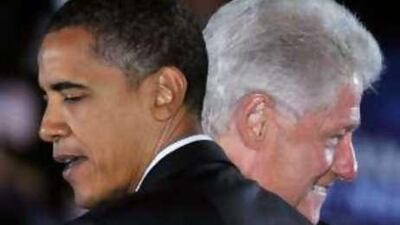Nearly three months ago, this column sought to assure readers that Barack Obama was a moderate in the tradition of his most immediate Democratic predecessor, the fiscally prudent Bill Clinton. But this is ridiculous. While it's one thing to borrow from Mr Clinton's neoliberal rubric, it's something else again to summon the apparatchiks of his presidency, from the former first lady - Mr Obama's new secretary of state - to his top economic advisers, who are returning to the White House after eight years in the political wilderness.
Some insiders even suggest Mr Clinton himself will be offered a prestigious post, such as ambassador to the UN. At this rate, the White House domestic help should put out a fresh litter box for Socks, the Clinton family cat. Having won the presidential election with a mandate for change, Mr Obama has turned his Cabinet into a happening for Clintonista baby boomers and wannabes: Rahm Emanuel, the "beltway rottweiler" and a senior adviser in the Clinton White House, will be Mr Obama's chief of staff. Larry Summers, who served as Mr Clinton's Treasury secretary, has been recycled as the head of the National Economic Council. The new budget director, Peter Orszag, worked closely with the Clinton administration on economic affairs. Bill Richardson, Mr Clinton's energy secretary and US ambassador to the UN, has been tapped to be the commerce secretary, while Eric Holder, America's next attorney general and the first black man to hold the office, was also the lawyer who successfully lobbied Mr Clinton to pardon Marc Rich, a corrupt commodities trader whose wife just happened to be a major donor to the Clinton presidential library.
Sprinkled over the Cabinet selection process is the fairy dust of Robert Rubin, Mr Clinton's first Treasury secretary and neoliberal patron saint, who until recently had been celebrated by both Democrats and Republicans as the architect of the Clinton boom years. The presumptive Treasury secretary, Timothy Geithner, is a Rubin acolyte, as are Messrs Summers and Orszag, as well as Austen Goolsbee, an adviser to Obama who will serve as the chief economist of the recently launched President's economic recovery advisory board.
Then there is Mrs Clinton, who has emerged from the ashes of a horribly botched campaign to become America's top diplomat. Her appointment as secretary of state will restore the executive brand of US politics into a Clinton caliphate. Is this such a bad thing? The Clinton presidency, stripped of its commander in chief's wretched excess, was known for a clear-eyed competence and a willingness to work with the opposition to balance budgets, reform the welfare state, liberalise financial markets and strike historic trade deals - no mean feat in a bitterly partisan company town like Washington.
But seen through the gauze that's holding together our battered global economy, it is now clear that Clinton neoliberalism took a good thing too far. The first priority of the Obama presidency should be to bridle what had been a rogue financial system, and it's hard to imagine a slate of Rubin protégés bringing any real enthusiasm to the job. While it would be reckless to drop neoliberalism completely as a reference point for the journey ahead, Mr Obama could have at least recruited a Keynesian to his "team of rivals", as the beltway press insists on calling it - a Paul Krugman, perhaps, or Joseph Stiglitz, both recent Nobel Prize winners.
Nor does the likely arrival of Mrs Clinton inspire much confidence. If the president-elect was sincere about his pledge to reach across party lines, he had two highly qualified Republican senators from which to choose: Richard Lugar, the chairman of the Senate foreign relations committee, and committee member Chuck Hegel. While both men initially supported the invasion of Iraq, they have been openly critical of the Bush administration's foreign policies and have advocated, as has Mr Obama, engagement with such problematic states as Iran and North Korea.
On no other foreign policy issue did Mr Obama and Mrs Clinton differ so conclusively during the primary campaign. One wonders if Mrs Clinton, should she still harbour presidential ambitions, could promote initiatives that would antagonise key electoral constituencies. Put bluntly, would Mrs Clinton, as secretary of state, faithfully shepherd a President Obama plan for a just and lasting peace in the Middle East, a process that would certainly alienate the pro-Israel lobby?
Mr Obama has assured the American people that it is his vision that will inform his presidency, not the biases of Clinton residuals. That may be, but the reality of his new Cabinet suggests a sad estrangement from the freshness and integrity of his campaign. As it stands, "change you can believe in", as Mr Obama famously pledged to deliver, is beginning to look more like "change you can see through". sglain@thenational.ae

